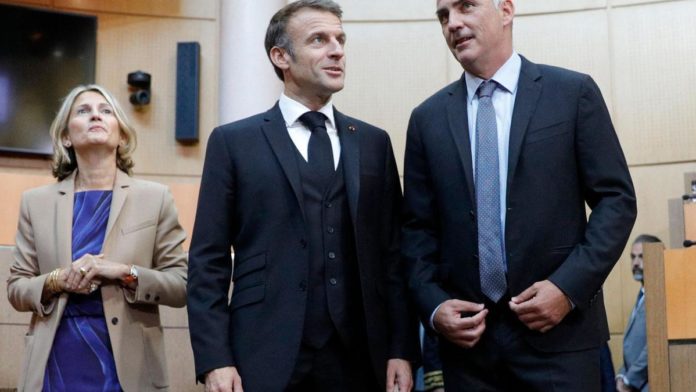Most of the Corsican nationalist parties have long been seeking an autonomy statute for the island. Except for the most radical independentists, who are not satisfied with a statute, the autonomy statute would be an important step for the autonomist nationalists as well as for another sector of independentism, because it could channel the main historical demands of the nationalists (official status of the Corsican language, recognition of the Corsican people in the French constitution, resident status and a Corsican parliament with legislative power). Paris has always rejected this request, but in the face of the rise of Corsican nationalism in recent years (the nationalists currently have 73% representation in the Corsican Assembly) the French government has given in, and has begun negotiations with the Corsican political representatives.
Two years ago, there were massive demonstrations and intense protests in Corsica following the death of pro-independence prisoner Yvan Colonna. The “Corsican trouble” entered the agenda of President Macron, and the highest French authority initiated contacts with representatives of the Corsican government. They put the request for the Statute of autonomy on the table. Macron proposed to draw up a draft, and so, in February 2024, the Corsican political parties agreed on a declaration containing six points. The new autonomy statute should include them:
- The French Constitution should recognise that Corsica is a ‘historical, linguistic and cultural community’.
2.- Official recognition of Corsican. Development of immersion and bilingual schools.
3.- The Statute of Autonomy should state that the citizens of Corsica have rights to the land. This means that they have a preferential right to have access to adequate housing (something that is currently very difficult due to touristification). Resident status.
4.- New financial pact
5.- Legislative power for the Corsican Assembly.
6.- Recognition of Corsican autonomy by the French Constitution.
The first four requests were approved unanimously, as all parties in the Corsican Assembly voted in favour. But the last two points were approved by an absolute majority, as they were not accepted by the French right-wing parties.
The approved proposal was passed on to the French Government by the Corsican Government , and negotiations between the two began. The cuts came later. Because France drew red lines, giving a categorical ‘No’ to the official status of the Corsican language and resident status, because they these ‘violated the equality of the French’ (the famous egalité).
In March 2024, after some political tensions, an agreement materialised between the French government and the Corsican representatives. The following points were approved for the Statute of Autonomy:
- The French constitution shall recognise Corsica as a ‘historical, linguistic and cultural community’.
- Corsica will enjoy limited legislative autonomy. An organic law will detail this.
3.- Corsica will have an autonomous status within the French Republic.
4.- Corsican language will not be official
5.- Resident status is not allowed.
6.- The Statute of Autonomy must be approved by the Corsican Assembly, as well as by the French Assembly and Senate. Finally, it must be approved by the citizens of Corsica through a referendum.
The Corsican Assembly, on 27 March 2024, approved the six-point agreement. The pro-independence representative of CORSICA LIBERA, and the French right (both for different reasons) voted against. The autonomist nationalists and the pro-independence CORE IN FRONTE supported the agreement.
Fabiana Giovannini is a former nationalist MP in the Corsican Assembly (FEMU A CORSICA) and currently editor-in-chief of the weekly ARRITTI. She told NAZIOGINTZA that the agreement with the French Government does not satisfy the nationalists, but could be a good starting point to overcome the current political vacuum. On the positive side, she mentions that the Corsican patriots have achieved a modification of the French Constitution. This change will take into account the uniqueness of Corsica, which may lead to new opportunities in the future.
Following the agreement between the French Government and Corsican political representatives, President Macron – unexpectedly – brought forward the French elections. This was of great concern to Corsican nationalists, because all polls predicted a victory in France for the far right (RN). It goes without saying that Marine Le Pen’s party opposes all the demands of Corsican nationalism, and shows a very belligerent attitude towards all nationalisms other than French. In the end, the RN did not achieve the expected results at the French level, and even less so in Corsica, where it was left without representation. In fact, none of the four Corsican MPs in the French Assembly will be from the French far right . Two of them will be Corsican nationalists (Paul-André Colombini and Michel Castellani), and the other two members of French political parties (the latter include a ‘Macronist’, Laurent Marcangeli, who also defends Corsican autonomist demands).
What next? The new French government will have to channel the Corsican issue, and take the autonomy statute agreement to the French Assembly and Senate. There, the votes in favour will need to be at least 3/5 to ratify the agreement. With the current composition, Fabiana Giovannini believes that the agreement could go ahead in the French Assembly. She sees it as more difficult to overcome this barrier in the Senate, where the opponents of the agreement are stronger. There, the Corsican deputies will have to work hard to overcome the closed positions of the French Jacobins. It will not be easy.
NOTE: Naziogintza has not been able to gather the opinions of the pro-independence
parties opposed to the agreement with the French government for this article. We
hope to be able to interview some of them in depth soon, and to record their
impressions.

